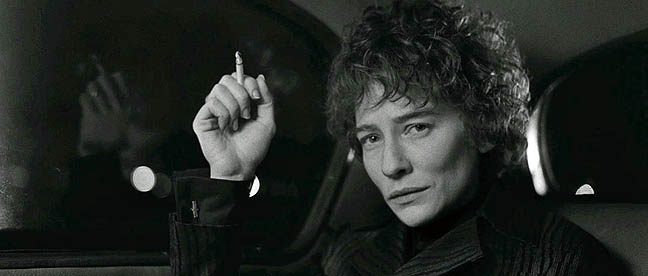By way of Dangerous Meta, a cardiologist argues in a new, soon-to-be-published e-book that Abraham Lincoln might be the earliest known case of a rare genetic disorder. “Sotos believes Lincoln had a genetic syndrome called MEN 2B. He thinks the diagnosis not only accounts for Lincoln’s great height, which has been the subject of most medical speculation over the years, but also for many of the president’s other reported ailments and behaviors.“
Month: November 2007
Patchwork Prankster.


What do Berkeley and the fanboy nation have in common this week? They both get really excited about socks…Empire Magazine makes a game of their slow reveal of their Heath Ledger Joker cover. Update: As you can now see, the cover’s been leaked. Update 2: And another, from the cover of Wizard. Looking better and better. Update 3: And yet a few more, from what look to be merchandising proofs. I don’t like these nearly as much, but then again it’s hard to sell anything comic-booky with a stark white background.
Howard’s End.
“Today the Australian people have decided that we as a nation will move forward.” Dubya loses an important conservative ally on the international front as long-standing Australian PM John Howard is voted out of office, to be replaced by Kevin Rudd of the Labor Party. “Rudd, a Chinese-speaking former diplomat, has also promised to sign the Kyoto Protocol on global warming, leaving the U.S. as the only industrialized country not to have joined it…Rudd promised to pull Australia’s 550 combat troops from Iraq in a phased withdrawal, and to quickly sign Kyoto. Howard had rejected withdrawal plans for Australia’s troops in Iraq, and refused to ratify the pact on reducing greenhouse gas emissions.” Ozzie ozzie ozzie! Welcome back to the reality-based community, y’all (and here’s hoping we catch up with you next year.)
Kinsley Selection.
“My candidate, at least at the moment, is Obama. When I hear him discussing some issue, I hear intelligence and reflection and almost a joy in thinking it through…That willingness, even eagerness, to figure things out seems to me more valuable than any amount of experience in allowing issues to wash over you as they do our incumbent president.” In an article on the value of various types of experience (spurred by this recent exchange), Slate founder and Crossfire alum Michael Kinsley comes out for Obama.
Mist-Conceived.
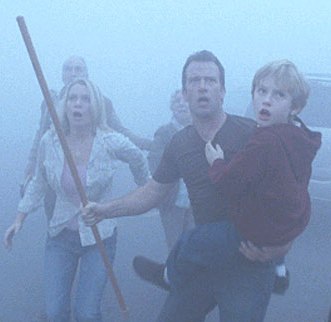 Going into the late-night showing of Frank Darabont’s version of Stephen King’s The Mist this evening, I was at best hoping for a good, scary B-movie — Prince of Darkness, The Thing — with perhaps a bit of choice sociopolitical grist (the Romero Deads, Invasion of the Body Snatchers, They Live) thrown in for good measure. (After all, the ominous poster and tagline of the film (“Fear changes everything”) pretty much announces there’ll be some post-9/11 commentary lurking amid the monsters.) Alas, The Mist fails on both fronts. Despite a good cast that do what they can with some woefully scripted material, the film is rarely very frightening — mostly because so many of the characters are so one-note that it’s hard to get all that concerned about their well-being. (The cheap FX don’t help.) Worse, Darabont’s attempts at allegory here come across as ponderous, ham-handed, and facile. The film aims to suggest that people in the grip of unyielding terror will do and fall for anything, which of course is a scary thought — one that not only resonates with our current political predicament, but permeates tons of horror movies from Night of the Living Dead to 28 Weeks Later. But, in its shrill, one-note portraits of religion and of “average” people (re: Red Staters), The Mist feels as elitist, hyperbolic, and echo chamber-y as a bad dKos talkback.
Going into the late-night showing of Frank Darabont’s version of Stephen King’s The Mist this evening, I was at best hoping for a good, scary B-movie — Prince of Darkness, The Thing — with perhaps a bit of choice sociopolitical grist (the Romero Deads, Invasion of the Body Snatchers, They Live) thrown in for good measure. (After all, the ominous poster and tagline of the film (“Fear changes everything”) pretty much announces there’ll be some post-9/11 commentary lurking amid the monsters.) Alas, The Mist fails on both fronts. Despite a good cast that do what they can with some woefully scripted material, the film is rarely very frightening — mostly because so many of the characters are so one-note that it’s hard to get all that concerned about their well-being. (The cheap FX don’t help.) Worse, Darabont’s attempts at allegory here come across as ponderous, ham-handed, and facile. The film aims to suggest that people in the grip of unyielding terror will do and fall for anything, which of course is a scary thought — one that not only resonates with our current political predicament, but permeates tons of horror movies from Night of the Living Dead to 28 Weeks Later. But, in its shrill, one-note portraits of religion and of “average” people (re: Red Staters), The Mist feels as elitist, hyperbolic, and echo chamber-y as a bad dKos talkback.
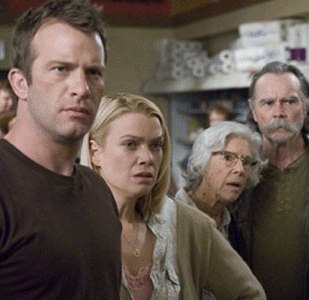 Set somewhere in Maine, as per King’s usual m.o., The Mist opens with several nods to what Darabont (probably correctly) assumed would be his core audience: the fanboy nation. For it turns out our protagonist David Drayton (Thomas Jane) is a movie poster artist a la Drew Struzan, and the first moments of the film feature him working in his studio on what’s obviously a poster of Roland the Gunslinger of Stephen King’s The Dark Tower. (The one-sheet from John Carpenter’s The Thing is also featured on the wall, and Drayton makes a quip early on about the standard two-face movie poster, pitched right at the AICN crowd.)
Set somewhere in Maine, as per King’s usual m.o., The Mist opens with several nods to what Darabont (probably correctly) assumed would be his core audience: the fanboy nation. For it turns out our protagonist David Drayton (Thomas Jane) is a movie poster artist a la Drew Struzan, and the first moments of the film feature him working in his studio on what’s obviously a poster of Roland the Gunslinger of Stephen King’s The Dark Tower. (The one-sheet from John Carpenter’s The Thing is also featured on the wall, and Drayton makes a quip early on about the standard two-face movie poster, pitched right at the AICN crowd.)
At any rate, after a particularly virulent storm, David, his son (the obligatory cute kid of the story), and his next-door neighbor, a hotshot lawyer from New York (Andre Braugher), all venture into town to get supplies. But, unfortunately for them, strange things are afoot at the Circle K: Very soon, an unnatural, unholy fog rolls in, and it becomes clear relatively quickly that staying exposed to it will get you killed in horrific fashion by large tentacles, winged insects, or other unspeakable Lovecraftian creatures from out of nowhere. And so the people at the supermarket hunker down for a long haul, but divisions quickly emerge among the ranks of the terrified. In the manner of horror films, Braugher’s lawyer character won’t believe anything that’s going on, and he and other denizens (Bill Sadler’s working-class stiff, for example) begin to take umbrage at imagined slights. Even more problematically, we have a true believer in our midst, the Bible-thumping spinster Mrs. Carmody (Marcia Gay Harden), and as the terror mounts and the Rapture looks nigh, she begins to relish her assigned role as Old Testament prophet, right down to the human sacrifices…
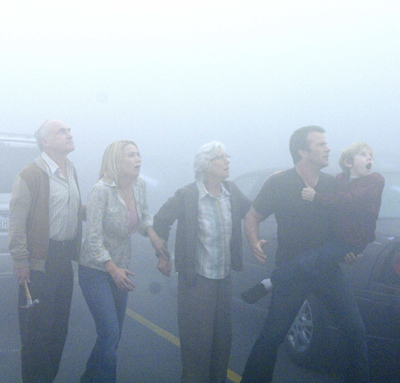 It’s been over fifteen years since my big King phase, so I barely remember the novella at all. (Of the Skeleton Crew stories, the ones that made the most impression on me were “The Jaunt” and “Survivor Type.”) But I presume some –probably even most — of the blame resides with King for Mrs. Carmody. (The End of Days psycho-Christian definitely seems in his wheelhouse.) Nevertheless, as written here, she’s way too over the top to be taken seriously, especially after Darabont starts layering on the post-9/11 stuff like a paste. (There’s a meeting held among the saner folk where they break down her appeal for the scared, in case you somehow missed the allegory thus far.) Worse, most of the people in the supermarket who fall under her spell — exemplified by Sadler’s malleable redneck — are so cardboard cut-out they might as well be carrying torches and pitchforks from the opening reel. You’d think given a apocalyptic situation like the one faced in The Mist that faith and religion might pop up in many forms. But there’s no nuance or depth at all to Darabont’s presentation, just evil religionists and their dupe followers.
It’s been over fifteen years since my big King phase, so I barely remember the novella at all. (Of the Skeleton Crew stories, the ones that made the most impression on me were “The Jaunt” and “Survivor Type.”) But I presume some –probably even most — of the blame resides with King for Mrs. Carmody. (The End of Days psycho-Christian definitely seems in his wheelhouse.) Nevertheless, as written here, she’s way too over the top to be taken seriously, especially after Darabont starts layering on the post-9/11 stuff like a paste. (There’s a meeting held among the saner folk where they break down her appeal for the scared, in case you somehow missed the allegory thus far.) Worse, most of the people in the supermarket who fall under her spell — exemplified by Sadler’s malleable redneck — are so cardboard cut-out they might as well be carrying torches and pitchforks from the opening reel. You’d think given a apocalyptic situation like the one faced in The Mist that faith and religion might pop up in many forms. But there’s no nuance or depth at all to Darabont’s presentation, just evil religionists and their dupe followers.
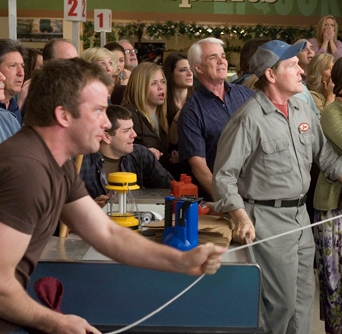 Then again, to be fair, none of the other characters are multi-dimensional either, and so I found myself rooting for actors instead. Thomas Jane is always a likable presence (he and Serenity‘s Nathan Fillion seem to be fighting it out for the mantle of the new Michael Biehn), and he’s solid enough here. Toby Jones (of the “other” Capote movie) is also stuck with a flat role — he’s Dignity Under Pressure — but makes an impression regardless. And it’s good to see Frances Sternhagen (a.k.a. the doctor from Outland) flitting about as a senior citizen not unwilling to smite false prophets with cans of peas. But, try as they might, they can’t raise the stakes here.
Then again, to be fair, none of the other characters are multi-dimensional either, and so I found myself rooting for actors instead. Thomas Jane is always a likable presence (he and Serenity‘s Nathan Fillion seem to be fighting it out for the mantle of the new Michael Biehn), and he’s solid enough here. Toby Jones (of the “other” Capote movie) is also stuck with a flat role — he’s Dignity Under Pressure — but makes an impression regardless. And it’s good to see Frances Sternhagen (a.k.a. the doctor from Outland) flitting about as a senior citizen not unwilling to smite false prophets with cans of peas. But, try as they might, they can’t raise the stakes here.
I’ll admit to liking a few brief flourishes in The Mist. At one point, a low-budget CGI tentacle hungrily crushes a bag of dog food, which is exactly the type of horrific-meets-the-mundane moment that King writes so well. Late in the game, the survivors of the tale to that point witness a truly Cthuhulian nightmare, all hooves and tentacles, one that’s nearly impossible to comprehend. And then there’s the ending…which I expect will be remembered for much longer than the rest of the film. I won’t give it away here, but I will say that, while admirable in its own way, it also felt like a Twilight Zone gimmick that came out of nowhere, felt unearned, and didn’t really hold up with the story to that point. (I can see an argument that ties it in to the rest of the film, but it’s a stretch.) Ultimately, The Mist isn’t as godawful as, say, Dreamcatcher, but it is yet another drab and mediocre King adaptation in a world full of them. If I were you, I’d wait for The Mist to clear.
Tapeheads.
As seen in front of The Mist this evening, Jack Black and Mos Def (are forced to) star in lo-fi remakes of your favorite films in the new trailer for Michel Gondry’s Be Kind Rewind, also starring Danny Glover, Mia Farrow, and Melonie Diaz. This looks more than a little ridiculous, but, after Science of Sleep, Dave Chappelle’s Block Party, and especially Eternal Sunshine, I’ll check out whatever Gondry is up to. (And Mos Def is always watchable…but where are the Swanky Modes?)
A Most Splendid Contraption.
The computer is personal again for Sherlock Holmes, Jack the Ripper, and the League of Extraordinary Gentlemen: By way of mkh at Hidden City, check out this swanky steampunk Victorian laptop, powered up via windup key and down via feather quill.
Undone by The Great Eye.
Have we inadvertently killed Schrodinger’s cat? No, it’s much, much worse. Cosmologists at Case Western Reserve and Vanderbilt speculate that mankind may have hastened the end of the universe by observing dark energy in 1998. “[Q]uantum theory says that whenever we observe or measure something, we could stop it decaying due what is what is called the ‘quantum Zeno effect,’ which suggests that if an ‘observer’ makes repeated, quick observations of a microscopic object undergoing change, the object can stop changing – just as a watched kettle never boils…Prof Krauss says that the measurement of the light from supernovae in 1998, which provided evidence of dark energy, may have reset the decay of the void to zero — back to a point when the likelihood of its surviving was falling rapidly. ‘In short, we may have snatched away the possibility of long-term survival for our universe and made it more likely it will decay,’ says Prof Krauss.” D’oh! But wouldn’t this presume that at no other place or time in our unfathomably gigantic universe did any other civilization make the same observations? Given the odds of intelligent life out there, that seems unlikely. (And, if you think this all sounds goofy and ridiculous, just wait until we get to the multiverse…)
Progressivism, Continued.
So, sorry to regale y’all with another long-winded, bloviating political post only two entries after the last one. But Ted of The Late Adopter asked an important follow-up to my comments on David Greenberg’s Obama piece and public-interest progressivism, namely: “If FDR, Stevenson, the Kennedys all spoke with the rhetoric of citizenship, when did the Democrats stop? With Johnson? Carter? During the 80s while trying to oppose Reagan?” And, while trying to respond in the comment section, I apparently blathered on so long that I broke the site. (“Access Denied with Code 406….severity [EMERGENCY]“) So, I’m posting my response as an entry instead (and there’s precedent for this anyway, as when Scully and I discussed the space program a few years ago.) So, if you find this all ponderous and insufferable, feel free to skip down to the previous entry, where I raved on at equal length about Todd Haynes’ I’m Not There (10/10!) And I promise to get back to more concise entries again soon…
| “Hmm, good question, Ted. Let me take a crack at it in the long-winded, digression-filled, multiple-answer manner we’ve been trained into. 🙂
First, while I don’t think he’s entirely comfortable with the Sandelian argument I’m making here, our mutual advisor posits one answer to this question in The End of Reform: This all began in earnest during WWII, when two things occurred. [1] The financial and productive power of Big Business became absolutely integral to the success of the war effort (thus there was less of a rationale for opposing corporate power in political life), and [2] Politicians and economists discovered in boom times and Keynesianiam that they could “grow the pie,” economically speaking, rather than be forced to choose a best way to carve it up. So, the civic-minded questions of political economy that dominated the early New Deal fell by the wayside. Obviously, Adlai and the brothers Kennedy come after WWII, so that in itself is not a complete answer. So I’d add the following trends: * 1968. Like 1919-1920, when the strike wave, the race riots, the Red Scare, the failure at Versailles, and various other traumatic events — the tail-end of the influenza wave, the death of TR, the Black Sox scandal, the widespread exposure to Freudianism, Einstein’s theory of relativity, and literary/artistic modernism, the recent Bolshevik revolution, and the Great War itself — all conspired to create great anxiety and help overturn the existing order, I would argue that the events of 1968 irrevocably rent the social fabric of the nation. It became especially hard for anyone after ’68 to talk about a civic project or a common public interest when America was divided so badly between left and right, black and white — rifts that Republicans like Nixon and Reagan would exploit to their advantage with the Southern strategy and veiled rhetoric about “law and order” — particularly when those leaders who did it best were gunned down in their prime. (This “culture war” is one of the same obstacles the progressives face in the ’20s, with the Red Scare, Scopes, Prohibition, the KKK, etc.) It also became problematic to speak in the language of citizenship when it was now well beyond clear that [a] women, African-Americans, and other minorities had been and were being treated in the civic culture as second-class citizens, and [b] the main civic project which the government was then asking its citizens to become engaged in was the war in Vietnam, which didn’t make a whole lot of sense. * GENERATIONS. While both the early New Left (see the Port Huron Statement) and the early civil rights movement (see King, in the original entry) have strong civic, and even Emersonian, components, both Sixties protest groups and the general mood of politics eventually swung over into the rhetoric of individualistic, rights-based liberalism. Meanwhile, the New Right, in its opposition to the New Deal and Great Society, also abandoned to a large extent the language of citizenship and virtue and made an appeal based on individual freedom as opposed to a corrupt, socialistic central government. (For an excellent civic-conservative reaction to this shift, see George Will’s 1983 book Statecraft as Soulcraft, the best thing he’s ever written.) Stevenson and the Kennedys were of the WWII generation, and — while I loathe the term “greatest generation,” unless you find something inherently great about training fire hoses on small children — they were more comfortable with the civic, “we’re all in it together” appeal of an earlier time. The appeal held less water with the much more skeptical Boomer generation, and, as the political culture embraced the individualistic liberalism/liberation of the late sixties and early seventies, with the nation at large. (You could argue Carter tried to make a civic argument on the energy question, and he was basically laughed out of the room.) Boomer politicians of either party — the Clintons, the Bushes — just aren’t as comfortable making civic-minded, public-interest arguments as their forbears. It’s not how they see the game is played. This is also due to: * WATERGATE, GATEGATE. From Vietnam to (particularly) Watergate to bureaucratic bloat to Iran-Contra to the fiascos of today, Americans have experienced a severe diminuition in what we believe government is and should be capable of. This open-eyed skepticism about centralized power should be a good thing, but not if we throw out the baby with the bathwater. You know how Richard said “a withdrawal in disgust is not the same as apathy?” Irony isn’t only the shackles of youth, it’s the shackles of our politics as well. There’s other things going on too. Not to get all Caro up in here, but LBJ, I think, was inherently uncomfortable making civic arguments as well (unless he was appropriating them, a la “We shall overcome.”) His view, shaped as it was by the exigencies of local Texas politics and his days running the Senate, was that everything ultimately boiled down to self-interest. (This partly explains how he could screw up Vietnam so badly. Eventually he thinks about buying off Ho Chi Minh with a TVA-style system of dams for the Mekong Delta, not realizing that Ho — and North Vietnam — are persevering in part because they’ve committed to an ideal more important to them then self-interest: national independence, a cause they felt they’d been fighting for for thousands of years.) But, perhaps most important to note, I think it’s fair to say that one reason the rhetoric of citizenship went out of style was because: * THE PATTERN WAS FLAWED, for all the reasons I said above. If I was a guy growing up in Chicago, Mississippi, or anywhere else, and I was being treated as a second-class citizen by the white power structure, either by being denied the right to vote or being snubbed out of quality jobs or housing, and then I was told my civic duty was to go die in Southeast Asia for lousy reasons (while the Dick Cheneys of the world piled up deferments), I might turn against the civic project too. If I was a woman who was told my civic duty basically amounted to finding a good man, keeping his stomach full and his house clean, and punching out healthy, patriotic American children, I’d rebel against this flawed social order as well. In short, the post-WWII, Cold War-obsessed civic culture of the 1950s and early 1960s was stifling and half-baked. It basically told citizens that their civic obligation was to buy as much as possible, to not consort with Reds, and, most importantly, to not cause any trouble. It needed to be broken up and reconfigured. (The progressives of the 1920s come to this conclusion as well, when they see how easily Wilsonian public-interest rhetoric enables the Red Scare (thus letting people on the Right brand every possible progressive program as “Bolshevik.”) This is why some of the most civic-minded Progressives — Jane Addams, for example — play a major part in the creation of the ACLU.) Here we get to the inherent problems with arguments that rely on civic-mindedness and appeals to citizenship. For one, a public interest that treats certain citizens as second-class is inherently and fatally flawed. Look at the early New Left — for all its progressive inclinations and civic-mindedness on paper and even in practice, it still basically treated women like the help. (See SNCC and Stokely Carmichael: “The only position for women in SNCC is prone.“) Plus, as a general rule of human nature, groups of people working together tend to desire conformity and despise independence, no matter what their political inclinations. This is as much a failing of the Left as it is the Right. (See Animal Farm, Dylan plugging in at Newport, etc.) Also, here the coercion problem in civic strands of political thought rears its head — Rousseau’s social compact forcing people to be free, and all that. An argument made on the basis of citizenship presumes coercion — citizens are expected to do this (vote, serve in the military, be informed about public matters) and not do that (drink, hang with Communists, etc.) Coercion isn’t necessarily a problem in and of itself — I think everyone agrees citizens should not kill, own slaves, etc. — but [1] telling people they have to do anything goes against the view of absolute individual freedom enthroned today, and [2] coercion invariably leads to conformity. which is ultimately the avowed enemy of republican government, which both relies on and should promote individual excellence. How do we get around this Gordian knot? My answer (which, not surprisingly, was also the answer of many of the Progressives) rests with Emerson. As I just said, an argument based on citizenship presupposes inculcating a certain virtue into citizens. But what if that virtue was individuality (not the same as individualism) and independence? The ability to think for oneself, the freedom to grow and innovate, and then the inclination to come back to the circle of citizens, share what you’ve learned, and deliberate about the public good? Emerson argues that we express our consent to government by expressing our dissent with government. If republican government is going to reach its full potential, it needs a community of independent-minded nonconformists. This is the type of citizenship a progressive candidate could and should get behind. And the Progressives did promote it — People always read Herbert Croly as an apologist for strong, centralized government, but this isn’t quite right. Decades before he got into poltics, Croly was an architecture critic — he was deeply concerned about art and aesthetics, and was trying to fashion a political architecture that would help individuals to thrive. At the end of The Promise of American Life (p. 414), Croly talks about what’s he’s been aspiring to create: “A national structure which encourages individuality as opposed to mere particularity is one which creates innumerable special niches, adapted to all degrees and kinds of individual development.” For him the “Jeffersonian ends” of individuality and improvement were as important as the “Hamiltonian means” of a strong central government. Ok, to step away from Planet Theory and get back to our real world: How would progressive-minded candidates of today work towards this new civic fabric? Well, first and most importantly, they would have to reconceive today’s liberal arguments in civic, progressive terms, to stop using the language of consumer choice and individual freedom — which plays so easily into the hands of corporate power and the small-government Right — like a crutch and bring back the language of citizenship and a shared narrative/vision/history that brings people together. The civic idea is so desiccated at the moment, for all the reasons mentioned in the original post, that just hearkening to its continued existence would be an immense step in the right direction (as well as a huge political boon for the Left regardless.) From there, progressives, like their counterparts a century ago, would have to work to fix a broken system. This means campaign finance and lobbying reform, doing what we can to ensure that unwashed money doesn’t corrupt the system as horribly as it does now, and that dollars don’t speak louder than people. As important here is voting reform. The voting system in our nation is absolutely abysmal. I refuse to believe that a country that can give almost every supermarket or store an ATM and almost every person a cellphone and iPod must be reduced to semi-functioning punchcard booths or electronic voting that can’t create a paper trail. And the long lines we see on every election day are patently shameful. Election Day should be a holiday (why not?), we should move to weekend voting, we should establish a Marshall plan to get every county in America an operating voting system, or something. Also, I doubt mandatory voting would ever work in this country, but what about tax incentives, or more likely public-private partnerships to encourage turnout? (Thanks for voting — here’s your free sundae at McDonalds and 20% off your next purchase at Borders.) The people who say this would be tantamount to bribing folks to vote are usually the people who don’t want voters showing up at the polls. Today’s progressives should also look to education. The (Bill) Clinton model of adult, lifelong education is a step in the right direction, but what’s missing is the civic component. Civics is deader than dead in our high schools and colleges, so on the most basic level that needs to be emphasized. But, equally importantly, we need to reemphasize the skills key to republican government: critical thinking, deliberation, etc. (Dare I say it, reading.) From an early age we all need to learn how to sift through information to reach a critically informed opinion, to ask the right questions about the information being presented to us, and — perhaps most importantly — to learn how to engage with people who disagree with us in a constructive fashion. And, a civic-minded progressive would continually look to our shared past and our shared future to bring Americans together. This would mean not only basking in but owning up to our collective past — say, adding a National Museum of Slavery to the Mall. It would also mean engaging in great civic projects which would bind the nation in common purpose (one of the many reasons I believe in the necessity of the space program.) Some might argue that I’m on crack for thinking that campaign finance reform, civics classes, a slavery museum, and/or a trillion-dollar space program is going to change what’s wrong with America. And, no, these aren’t sufficient. But, as I said in the original post, the story is everything. If our leaders help us reconceive our view of the government — to remind us that the government is an expression of our shared values and ambitions as citizens — then we can begin to look at other problems differently. If we’re all in it together, the continued existence of child poverty, or the woeful lack of health insurance for many, here in the richest nation on Earth becomes that much more unacceptable. I’m not naive enough to believe that embracing civic progressivism or adopting the rhetoric of citizenship is going to change the country immediately, that money is suddenly going to disappear from our political process thanks to one new law, or that the next iteration of American’s civic fabric will be bereft of the types of discrimination in evidence in the 1860s, 1920s, 1960s and beyond. But, to borrow from Cornel West, “To understand your country, you must love it. To love it, you must, in a sense, accept it. To accept it as how it is, however is to betray it. To accept your country without betraying it, you must love it for that in it which shows what it might become. America – this monument to the genius of ordinary men and women, this place where hope becomes capacity, this long, halting turn of the no into the yes, needs citizens who love it enough to reimagine and remake it.“ To put the same argument another way, there’s a scene in The Princess Bride where our hero Westley (Cary Elwes) and the princess Buttercup (Robin Wright Penn) are on the run and looking for safety in the dastardly and invariably fatal Fire Swamp. “We’ll never survive,” bemoans Buttercup, to which Westley responds: “You’re only saying that because no one ever has.” That pretty much sums up how I feel about a lot of things, including progressivism in politics. Does true love exist? I dunno. Lord knows it hasn’t seemed like it, and I’ve been kicked in the teeth often enough at this point to think not. But that doesn’t mean I shouldn’t live my life as if it could happen. Same with this view of civic progressivism. David Greenberg may be right that civic-minded candidates have done pretty poorly in recent history, but that doesn’t mean the principle is flawed, or that we should stop trying. And, besides, to jump over to another fantasy classic, you don’t wear the ring — you destroy the ring. So I’d rather stake my claim with the public interest progressives, even if that doesn’t play as well as all the blatant appeals to self-interest, than get all Boromir up in here and start acting like Republican-lite, which all too many of our party frontrunners have been doing these past few years. |
His Back Pages.
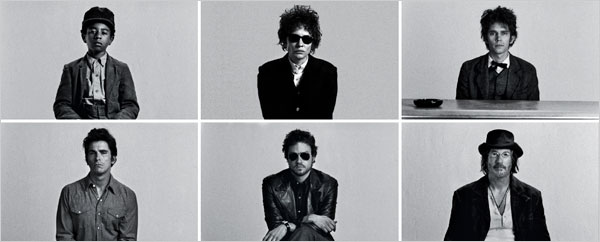
“A song will lift, as the mainsail shifts, and the boat drifts on to the shoreline.” If you’ve been reading this site for any length of time, you probably already know that I drank the Bob Dylan kool-aid a good while ago. So, more than likely, my opinion of Todd Haynes’ I’m Not There, which I raced down (on the D-train, no less) to catch at the Film Forum this morning, should be taken with at least a shaker of salt. And, to be honest, it’s hard to imagine how this film plays to people who aren’t all that into Dylan — If you don’t already have a basic sense of his story and his various periods, I could see it being as incoherent and irritating as Southland Tales (although it’s assuredly better-made.) But, if you do have any fondness for Bob, oh my. The short review is: I loved it. Exploding the conventional music biopic into shimmering, impressionistic fragments, Todd Haynes has captured lightning in a bottle here. The movie is clearly a labor of love by and for Dylan fans, riddled with in-jokes, winks, and nods, and I found it thoughtful, funny, touching, and wonderful. Put simply, while No Country for Old Men is right up there, I’m Not There is my favorite film of the year. I can’t wait to see it again.
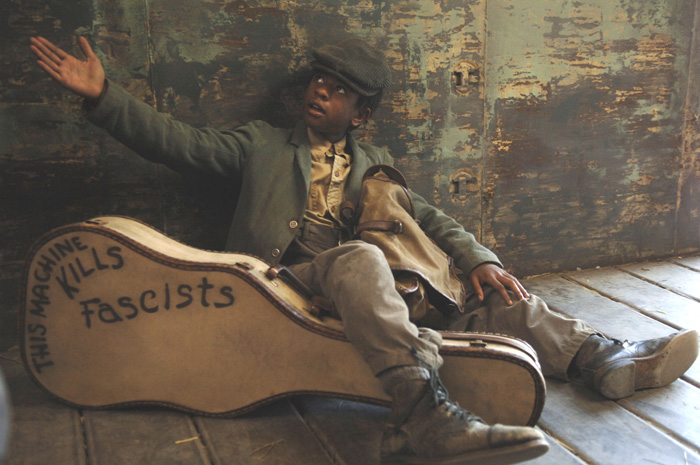 Like Navin Johnson, Bob Dylan was born a poor black child. (Marcus Carl Franklin) Ok, perhaps not. But Hayne’s movie doesn’t really aim to tell the story of one Robert Zimmerman of Hibbing, Minnesota. anyway. — He’s not there. Instead I’m Not There refracts Dylan through a prism of sorts, giving us multiple versions of the man (and myth) at various stages in his life and work. And, so, after a first person POV shot of “Dylan” (us?) taking the stage in ’66, and a title shot involving a potentially-momentous motorcycle, we are introduced to one Woody Guthrie (Franklin), an 11-year-old folk wunderkind traveling hobo-style along the rails, singing union songs and making up his past as he goes along. But the times they-are-a-changin’, and, as a kindly matron informs Woody, the old songs don’t necessarily do justice to the problems of 1959. Enter Jack Rollins (Christian Bale), an earnest young troubador who once lit Greenwich Village on fire with his ballads of social protest (“finger-pointin’ songs”), and, having rejected the folk scene and found Jesus, is now the subject of a No Direction Home-style documentary. (Julianne Moore does a Joan Baez impression here, straight out of Scorsese’s doc, which is pretty hilarious, and maybe even a little mean — note the business with the cat.)
Like Navin Johnson, Bob Dylan was born a poor black child. (Marcus Carl Franklin) Ok, perhaps not. But Hayne’s movie doesn’t really aim to tell the story of one Robert Zimmerman of Hibbing, Minnesota. anyway. — He’s not there. Instead I’m Not There refracts Dylan through a prism of sorts, giving us multiple versions of the man (and myth) at various stages in his life and work. And, so, after a first person POV shot of “Dylan” (us?) taking the stage in ’66, and a title shot involving a potentially-momentous motorcycle, we are introduced to one Woody Guthrie (Franklin), an 11-year-old folk wunderkind traveling hobo-style along the rails, singing union songs and making up his past as he goes along. But the times they-are-a-changin’, and, as a kindly matron informs Woody, the old songs don’t necessarily do justice to the problems of 1959. Enter Jack Rollins (Christian Bale), an earnest young troubador who once lit Greenwich Village on fire with his ballads of social protest (“finger-pointin’ songs”), and, having rejected the folk scene and found Jesus, is now the subject of a No Direction Home-style documentary. (Julianne Moore does a Joan Baez impression here, straight out of Scorsese’s doc, which is pretty hilarious, and maybe even a little mean — note the business with the cat.)
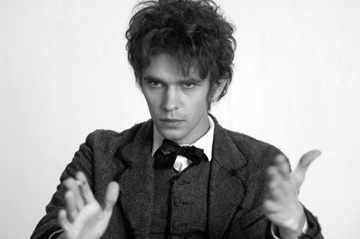 By now, you probably see where this is going. Post-Newport, Cate Blanchett shows up as Jude, a.k.a. the reedy, combative, drugged-out, and dog-tired Dylan of (blonde on) Blonde on Blonde and Don’t Look Back. (It takes a woman like her, to get through, to the man in him.) Ben Whishaw shares the load of society’s probing as Arthur Rimbaud, a Bob who spends most of the movie facing down some unknown interlocutors. Heath Ledger’s Robbie is the romantic and the womanizer, the Dylan who woos the heartbreakingly beautiful Claire (Charlotte Gainsbourg, playing an amalgamation of Suze Rotolo and Sara Lownds), looks for solace in a normal life outside Woodstock, and eventually stares into the abyss of Blood on the Tracks. And Richard Gere is Billy, an aging outlaw hiding out in Riddle, MO, part of the mythical American landscape conjured by Bob in “Bob Dylan’s 115th Dream,” “Desolation Row,” John Wesley Harding, The Basement Tapes, “Blind Willie McTell,” and countless other songs.
By now, you probably see where this is going. Post-Newport, Cate Blanchett shows up as Jude, a.k.a. the reedy, combative, drugged-out, and dog-tired Dylan of (blonde on) Blonde on Blonde and Don’t Look Back. (It takes a woman like her, to get through, to the man in him.) Ben Whishaw shares the load of society’s probing as Arthur Rimbaud, a Bob who spends most of the movie facing down some unknown interlocutors. Heath Ledger’s Robbie is the romantic and the womanizer, the Dylan who woos the heartbreakingly beautiful Claire (Charlotte Gainsbourg, playing an amalgamation of Suze Rotolo and Sara Lownds), looks for solace in a normal life outside Woodstock, and eventually stares into the abyss of Blood on the Tracks. And Richard Gere is Billy, an aging outlaw hiding out in Riddle, MO, part of the mythical American landscape conjured by Bob in “Bob Dylan’s 115th Dream,” “Desolation Row,” John Wesley Harding, The Basement Tapes, “Blind Willie McTell,” and countless other songs.
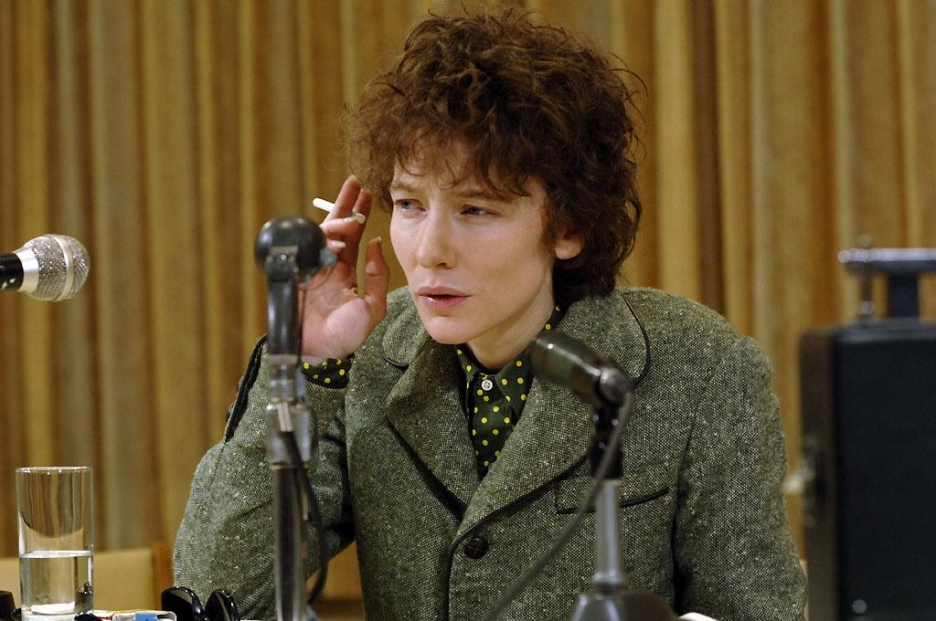 Each of this fellowship of Dylans does quality work in the role. Cate Blanchett is getting the most press these days, perhaps deservedly so, but I was as impressed with Bale, Whishaw, Franklin, and particularly Ledger — After seeing the extent of his range here, it’s pretty clear he’s going to kill as the Joker next summer. And other actors resonate here as well. I already mentioned Julianne Moore and the exquisite Charlotte Gainsbourg. (My crush on the latter, already simmering after The Science of Sleep, will no doubt grow by leaps and bounds now, particularly once you factor in her fragile, breathy version of “Just Like a Woman” on the soundtrack. With a face that’s at once honest, open, statuesque, and melancholy, she’s the perfect sad-eyed lady of the lowlands.) Also notable is David Cross, the spitting image of Allen Ginsberg, Michelle Williams invoking Factory Girl Edie Sedgwick, and a well-preserved Richie Havens delivering a Joe Cocker moment with his version of “Tombstone Blues.” Bruce Greenwood (of Thirteen Days, The Sweet Hereafter, and recently John from Cincinnati) does particularly impressive work as Jude’s nemesis, a BBC newsman who wants to pin both the mercurial singer and the meaning of his (her) music to the wall like a butterfly. Clearly, something is happening here, but he don’t know what it is…
Each of this fellowship of Dylans does quality work in the role. Cate Blanchett is getting the most press these days, perhaps deservedly so, but I was as impressed with Bale, Whishaw, Franklin, and particularly Ledger — After seeing the extent of his range here, it’s pretty clear he’s going to kill as the Joker next summer. And other actors resonate here as well. I already mentioned Julianne Moore and the exquisite Charlotte Gainsbourg. (My crush on the latter, already simmering after The Science of Sleep, will no doubt grow by leaps and bounds now, particularly once you factor in her fragile, breathy version of “Just Like a Woman” on the soundtrack. With a face that’s at once honest, open, statuesque, and melancholy, she’s the perfect sad-eyed lady of the lowlands.) Also notable is David Cross, the spitting image of Allen Ginsberg, Michelle Williams invoking Factory Girl Edie Sedgwick, and a well-preserved Richie Havens delivering a Joe Cocker moment with his version of “Tombstone Blues.” Bruce Greenwood (of Thirteen Days, The Sweet Hereafter, and recently John from Cincinnati) does particularly impressive work as Jude’s nemesis, a BBC newsman who wants to pin both the mercurial singer and the meaning of his (her) music to the wall like a butterfly. Clearly, something is happening here, but he don’t know what it is…
 Do you need to know a lot about Dylan going in? Well, it undoubtedly helps. I’m Not There is rife throughout with Dylanalia, and, yes, at times it’s dropped as blatantly as the groaners in Across the Universe: Jude mutters “Just like a woman!” at one point as a punchline, and an LBJ on the wall during a party strangely exclaims “It’s not yellow, it’s chicken.” But, others are more obscure, hidden in the fabric of the film like a crossword puzzle for Dylanophiles. Many of the strange denizens of Gere’s Riddle recall characters in songs or various Dylan incarnations, from the whitefaced troubador at Ms. Henry‘s funeral to the Union solders and passing Lincoln on stilts. As Robbie and Claire (Renaldo and Clara?) have one of those tired, terse phone discussions that signifies the end is near, a movie poster over her shoulder reads “CALICO” (i.e. “Sara,” the “calico sphinx in a scorpio dress (you must forgive me my unworthiness.)“) Or, in the scene accompanying one of Dylan’s masterpieces, “Visions of Johanna,” the Ledger Dylan, a movie star of sorts, is bored on the road and skirt-chasing one of his co-stars. As this goes down, we happen to see some elderly crones in neck braces (“the jelly-faced women all sneeze“), Ledger walking in a museum (“Inside the museum, Infinity goes up on trial“), the Mona Lisa (who “musta had the highway blues, you can tell by the way she smiles“), and the co-star he’s tailing, of course, is named Louise. (“Louise, she’s all right, she’s just near. She’s delicate and seems like the mirror. But she just makes it all too concise and too clear that Johanna’s not here.“)
Do you need to know a lot about Dylan going in? Well, it undoubtedly helps. I’m Not There is rife throughout with Dylanalia, and, yes, at times it’s dropped as blatantly as the groaners in Across the Universe: Jude mutters “Just like a woman!” at one point as a punchline, and an LBJ on the wall during a party strangely exclaims “It’s not yellow, it’s chicken.” But, others are more obscure, hidden in the fabric of the film like a crossword puzzle for Dylanophiles. Many of the strange denizens of Gere’s Riddle recall characters in songs or various Dylan incarnations, from the whitefaced troubador at Ms. Henry‘s funeral to the Union solders and passing Lincoln on stilts. As Robbie and Claire (Renaldo and Clara?) have one of those tired, terse phone discussions that signifies the end is near, a movie poster over her shoulder reads “CALICO” (i.e. “Sara,” the “calico sphinx in a scorpio dress (you must forgive me my unworthiness.)“) Or, in the scene accompanying one of Dylan’s masterpieces, “Visions of Johanna,” the Ledger Dylan, a movie star of sorts, is bored on the road and skirt-chasing one of his co-stars. As this goes down, we happen to see some elderly crones in neck braces (“the jelly-faced women all sneeze“), Ledger walking in a museum (“Inside the museum, Infinity goes up on trial“), the Mona Lisa (who “musta had the highway blues, you can tell by the way she smiles“), and the co-star he’s tailing, of course, is named Louise. (“Louise, she’s all right, she’s just near. She’s delicate and seems like the mirror. But she just makes it all too concise and too clear that Johanna’s not here.“)
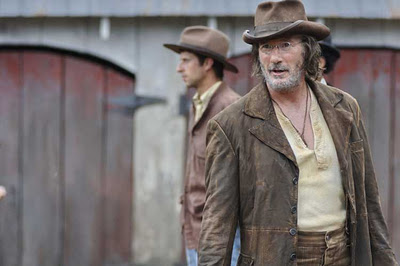 If this all is starting to sound like two and half hours of insufferable inside-baseball for Dylanheads, well, I guess it might be. But I really don’t think it plays like that. (And I also don’t think that was the appeal for me either. Both Masked and Anonymous and Twyla Tharp’s The Times They Are-A Changin’ trafficked in similar inside gags, and I didn’t enjoy those anywhere near as much as this film.) Basically, I’m Not There is too vibrant and enthusiastic to feel smug, remote, or exclusive about its fondness for Dylan. It never purports to define the meaning of any particular song, showing instead that more often than not their beauty lies in their ambiguity. (For example, both defenders of the cultural Old Guard and the Black Panthers feel “Ballad of a Thin Man” is about them.) And it often pokes fun at the Dylanophiles among us, throwing in a number of disgruntled fans at various times (particularly after Bob plugs in) and having Jude get pestered by an overeager amateur Dylanologist after hanging with the Beatles (a very jolly cameo indeed.) Plus, for all the reverence, Dylan himself isn’t as whitewashed as he was in No Direction Home — His drug habit, his youthful arrogance and occasional thin skin, and some questionable views on women poets are all on display here.
If this all is starting to sound like two and half hours of insufferable inside-baseball for Dylanheads, well, I guess it might be. But I really don’t think it plays like that. (And I also don’t think that was the appeal for me either. Both Masked and Anonymous and Twyla Tharp’s The Times They Are-A Changin’ trafficked in similar inside gags, and I didn’t enjoy those anywhere near as much as this film.) Basically, I’m Not There is too vibrant and enthusiastic to feel smug, remote, or exclusive about its fondness for Dylan. It never purports to define the meaning of any particular song, showing instead that more often than not their beauty lies in their ambiguity. (For example, both defenders of the cultural Old Guard and the Black Panthers feel “Ballad of a Thin Man” is about them.) And it often pokes fun at the Dylanophiles among us, throwing in a number of disgruntled fans at various times (particularly after Bob plugs in) and having Jude get pestered by an overeager amateur Dylanologist after hanging with the Beatles (a very jolly cameo indeed.) Plus, for all the reverence, Dylan himself isn’t as whitewashed as he was in No Direction Home — His drug habit, his youthful arrogance and occasional thin skin, and some questionable views on women poets are all on display here.
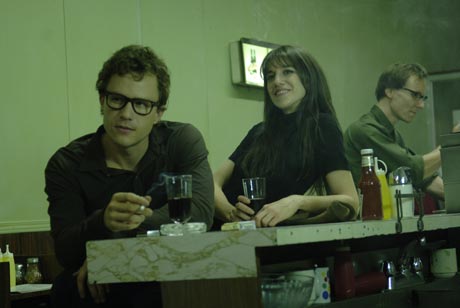 A talented artist in his own right (case in point: Safe and Far from Heaven), Haynes employs all the magic of the movies to tell Dylan’s story. The Robbie-and-Claire scenes are filmed in color occasionally as riotous as in Hayne’s homage to Douglas Sirk, Jack’s social protest and Christian periods are told in faux-documentary fashion, and Jude’s England tour is all black-and-white cinema verite, a la Don’t Look Back. That’s why I’m pretty sure i’m Not There will work even for people who don’t know the first thing about Dylan. It remains visually interesting throughout, and never falls into the usual biopic rut, that standard, hackneyed rise, fall, and rise again narrative which tends to bring down even otherwise well-made entrants in the genre like Walk the Line.
A talented artist in his own right (case in point: Safe and Far from Heaven), Haynes employs all the magic of the movies to tell Dylan’s story. The Robbie-and-Claire scenes are filmed in color occasionally as riotous as in Hayne’s homage to Douglas Sirk, Jack’s social protest and Christian periods are told in faux-documentary fashion, and Jude’s England tour is all black-and-white cinema verite, a la Don’t Look Back. That’s why I’m pretty sure i’m Not There will work even for people who don’t know the first thing about Dylan. It remains visually interesting throughout, and never falls into the usual biopic rut, that standard, hackneyed rise, fall, and rise again narrative which tends to bring down even otherwise well-made entrants in the genre like Walk the Line.
And, of course, it benefits from having one of the better soundtracks out there, and Haynes has expertly weaved Dylan’s music (and some quality cover versions) into almost every moment of the film. Let me put it this way: Within the first five minutes, I’m Not There features some period NYC subway footage set to the irrepressibly toe-tapping “Stuck Inside of Mobile With the Memphis Blues Again.” (Also another visual pun — the subway folk are “stuck inside of mobile.”) From that moment on, the movie pretty had much me. In the end, I don’t know if non-Dylan folk will vibe into it or not, but I found I’m Not There a splendid gift from one Dylan fan to the rest of us, and assuredly one of the more inventive and captivating biopics in recent filmdom. “And the sun will respect every face on the deck, the hour that the ship comes in.“
